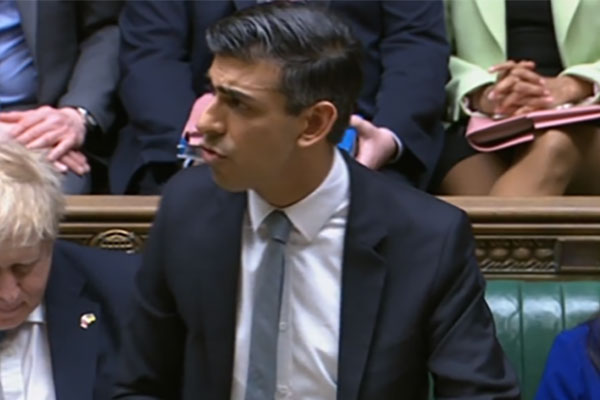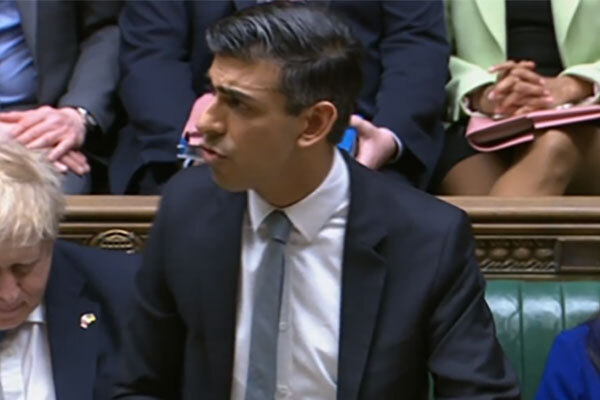Spring Statement: sector responds to Rishi Sunak’s announcements
The housing sector has responded to Rishi Sunak’s Spring Statement today. While many welcomed VAT relief on green energy measures, some warned that the cost of living crisis is fuelling inflation through a “wage-price spiral” that could push people into homelessness.
Figures from across the housing sector have responded to the chancellor’s Spring Statement, which included a commitment to increase welfare support for low-income households, scrapping VAT on energy efficiency measures and changes to the National Insurance threshold.
Kate Henderson, chief executive of the National Housing Federation, said: “The increase in the household support fund and changes to the National Insurance threshold are welcome, but there will still be many families on the lowest incomes who are very anxious about the cost of living, particularly rising energy bills.
“Many housing association residents have their heating and hot water delivered to their home via a communal heat network, rather than an individual boiler. These networks are not covered by the energy price cap. Government should put additional support in place to ensure residents using heat networks aren’t facing huge and unmanageable gas and electric bills.
“We also hope the government does not lose sight of its long-term sustainability goals. Insulating and retrofitting our homes will be vital to keeping bills lower and improving the UK’s energy independence in coming years.
“The VAT cut on green home measures for homeowners is positive. An additional two years of funding to 2027 for the Social Housing Decarbonisation Fund would provide the certainty and capacity housing associations need to do more, quicker. We look forward to reading the government’s forthcoming energy strategy.”
Matthew Walker, chair of PlaceShapers, said: “Chancellor Rishi Sunak recognised the importance of fairness in meeting the cost-of-living crisis. But it impacts those on the lowest incomes most. There are millions for whom the crisis will remain a terrible, frightening reality.
“The heartbreaking choice between heating and eating reflects the reality of spiralling energy bills. The VAT relief on green energy measures must extend to housing associations as we are at the forefront of delivering retrofit. This allows us to do more, quicker, to give people warm homes, help reduce energy demand and meet the UK’s net zero ambition.
“We welcome the positive measures in the statement but more help is needed from the government for the fairness they are keen to deliver.”
Mark Perry, chief executive at Vivid, said: “The chancellor’s announcements today are a disappointing response for those most severely affected by what’s been described as the cost of living crisis. This is a missed opportunity. Whilst the increase in national insurance threshold and fuel duty reductions might help those in work, those that aren’t working won’t see any of the benefits. I think the Office for Budget Responsibility has suggested that in real terms it forecasts the highest reduction in disposable income since record began, in 1950!
“With the economy £20bn ahead of where we expected it to be, surely the government could have used some of that to help those most struggling. Perhaps reinstating the £20-per-week Universal Credit cut that took place last year, basing the inflation rate used to uplift benefits to the position it is now at 6.2%.
“The measures announced today won’t really help the reality of what our customers are experiencing when, say, their small £20-per-week budget for food and household essentials used to get them 20 items and will now only just stretch to 17. More needs to be done.”
Clare Miller, chief executive of Clarion Housing Group, said: “We very much welcome the government’s commitment today to help families with the cost of living. The impact of these rising costs is being felt particularly hard by those living in our homes – rising inflation has a disproportionate impact on low-income households.
"The raising of the threshold at which National Insurance is to be paid is likely to be the measure which will have the single biggest impact on our lowest-paid residents. The increase and extension of the Household Support Fund to help vulnerable families cover the costs of day-to-day essentials is also particularly welcomed, and we will ensure we are playing a role in raising awareness of this help available to our residents who might benefit from it.”
The British Property Federation said: “We welcome the move to cut VAT for the installation of energy-efficient materials such as solar panels, but we would urge the chancellor to consider more radical action. The energy crisis has placed households across the country under severe pressure and has brought into sharp focus the need for homes that are more efficient and resilient.
“Cutting VAT on all home improvements would have a more meaningful impact, incentivising homeowners to modernise their homes and make them more energy-efficient. We all need to fully commit to the decarbonisation of the built environment if the UK is to achieve its net zero ambitions.”
Shaun Davies, chair of the Local Government Association’s Resources Board, said: “This year will be the toughest for more than half a century, particularly for those on lower incomes, so it is good that the chancellor is taking steps with financial measures which will help mitigate against some of those pressures for struggling households.
“As the impact of cost of living concerns grow, the mainstream benefits system will need to provide the first line of support for people so that councils and local partners can concentrate their limited resources on helping those who need tailored and additional help.
“The increase in short-term government funding through the Household Support Fund is a positive step but cannot on its own address underlying cost of living pressures, or to help people to make the most of their money and strengthen financial resilience. With many households likely to be economically vulnerable for some time to come, councils also want to work with government on an effective long-term solution to preventing poverty and disadvantage that moves away from providing crisis support towards improving life chances.”
Kush Rawal, director of residential investment at SO Resi, said: “Yet again the odds seem to be stacked against young people, with a trilogy of rising costs set to unfold over the coming months. As the cost of living crisis emerges, combined with interest rate rises and continued house price growth, many first-time buyers are facing the grim reality that they will either need to delay their plans to move or significantly scale down what they can buy.
“However, despite a seemingly negative backdrop, we can be cautiously optimistic as data shows that the number of first-time buyers in recent years continues to climb thanks to the availability of government-backed schemes and products designed to mitigate the high costs typically associated with homeownership.
“As Help to Buy is removed, shared ownership in particular will become the primary support mechanism for thousands of first-time buyers who do not have access to the ‘bank of mum and dad’ and simply cannot afford a 10% deposit at full market value.”
Matt Downie, chief executive at Crisis, said: “What’s clear from this statement is that people up and down the country will be pushed into homelessness. It will not give support to families facing the cost of living crisis.
“Achieving this relies on keeping people in their homes and yet this budget provided little relief for desperate people trying to keep a roof over their head as inflation runs rampant and energy bills skyrocket.
“The UK government must urgently invest in housing benefit so that low-income families can cover the cost of their rent and increase benefits in line with inflation, so people have a fighting chance to put food on the table.”
Rick Henderson, chief executive at Homeless Link, said: “Today Rishi Sunak admitted that vulnerable households need targeted support to get through the coming few months of an unprecedented cost of living crisis. But unfortunately, by focusing on tax cuts for those in work, the measures announced don’t go anywhere near far enough to provide the stability the most vulnerable households need to avoid being pushed into homelessness.
“While Rishi Sunak announced a range of policies to help people in work in the short term, he has not listened to calls from across the political spectrum to invest in our struggling welfare system, and has almost entirely excluded those not in full-time work from consideration.
“Rather than relying on temporary fixes like the Household Support Fund, the government should seek to make our welfare system fit for purpose by unfreezing Local Housing Allowance rates and restoring the Universal Credit £20 uplift to help those on low incomes stay afloat and lead dignified lives. The £40m cut to the Discretionary Housing Payment announced last week will not make this any easier.
“When the cost of living increases, homelessness does too.”
David Woolman, director at developer Woolbro Group, said: “Buried within the chancellor’s Spring Statement today was confirmation that the Tories have all but abandoned their plans to tackle Britain’s housing crisis.
“Property prices are now at an all-time high, meaning many hopeful first-time buyers will struggle more than ever to get a foot on the ladder. And as inflation creeps up alongside energy and grocery costs, so too is the cost of renting, piling further pressure on to Britain’s already squeezed ‘generation rent’.
“At the very least, the chancellor should have today announced either an extension to or a replacement for the Help to Buy scheme, which comes to an end in March next year. With big house builders already looking to downsize the number of new builds they deliver every year in the run-up to the scheme’s end, the government simply cannot afford inaction.”
Ben Beadle, chief executive of the National Residential Landlords Association, said: “We welcome the decision to scrap VAT on energy efficiency measures. However, it remains disappointing that the government has again failed to explain what will be required of the rental sector when it comes to energy improvements.
“More broadly, as renters, along with all others, face a cost of living crisis, the chancellor should have reversed his decision to freeze housing benefit rates. Without this, those relying on the benefit will find it increasingly difficult to afford their rents.”
Timothy Douglas, head of policy and campaigns at Propertymark, said: “We welcome today’s announcement that VAT will be cut on the installation of energy-saving materials in residential properties. With rising energy costs as well as looming energy efficiency targets for the property sector, financial incentives are well needed.
“We will be scrutinising the details of this scheme as they are released to ensure they have the maximum impact for all homeowners, including investors in the private rented sector, and that landlords and letting agents can take full advantage of the change.”
Phil Hurley, chair of the Heat Pump Association (HPA), said: “The Spring Statement comes with great news for the heat pump industry and households today. The HPA has been working hard behind the scenes calling for financial incentives to tackle the barriers to heat pump uptake, and the decision to cut VAT from 5% to zero on energy-saving measures is an important step forward.
“Whilst this decision alone will not be enough to enable all households to access technologies such as heat pumps, we are confident that it will play a role in helping to accelerate the switch to low-carbon heat. But we must remember that more steps still need to be taken to support the roll-out of heat pumps, including the removal of illogical environmental levies on electricity.”
Josie Parsons, chief executive at Local Space, said: “Whilst some of the measures announced by the chancellor today are welcome, the government needs to go much further in ensuring that adequate support is in place to prevent a huge rise in homelessness as a result of people not being able to pay their rent or mortgage.
“We would therefore urge policymakers to go much further in their support for these vulnerable people, including additional investment in providing much more genuinely affordable housing, and support to local authorities to address the impending crisis.”
Sign up for our Breaking News alert
Already have an account? Click here to manage your newsletters












